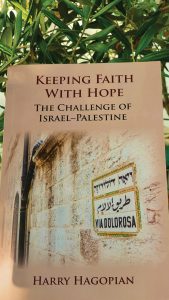By Dr. Harry Hagopian, edited by Simon Barrow
Ekklesia Publishing (United Kingdom)
June 2019, 140 pages, paperback, £11.99
Available in all bookstores and online
So let us get down to brass tacks: what is my new book all about?
In its essence, it is an anthology of my articles over the past twenty years that strives to mirror my decades-long hands-on involvement with the Israeli-Palestinian conflict. There are, of course, new additions and updates as well as a glossary that attempts to define those sensitive and oft-controversial terms associated with this conflict. Add to this a foreword by Rami G. Khouri, who is, in my mind, one of the compasses of the MENA and Gulf regions, as well as a preface by the editor Simon Barrow, who is also the director of the Ekklesia think tank.
This 140-page short read, quintessentially a vessel for my own thoughts on this fraught topic, does not pretend to offer a magic bullet – dare I add here a deus ex machina – to a conflict between two peoples and three faiths that has been festering for at least 52 years. Far from it! What my book does offer though is a cluster of five different themes that have colored my observations and impacted my analyses over twenty years. It also gauges how my thoughts have seesawed between moments of optimism and pessimism as the vision for an independent Palestine was challenged – whether by omission or commission, brutality or subtlety – by a perilous state of inertia.
Over the years, I have witnessed how the sanguine dream of the 1990s morphed into a nightmare that worked hard to spoliate Palestinian lands. I have seen an ugly separation wall come up that eats away more Palestinian lands and separates Palestinians from their dream for a state on the internationally recognized borders of 1967. I have seen the number of settlers and settlements on Palestinian lands metastasizing so deliberately that both the demography and geography of the country are now under co-equal threat. I have seen roadblocks and checkpoints that are reminiscent of South Africa’s hated pass laws that criminalized black South Africans if they ever stepped into a white city, or else when black people were relocated from areas zoned for white people.
Take these visible signs of policy-fed humiliation, brutality, or even victimization, and simply substitute “black South African” for “Palestinian.” Indeed, Public International Law defines apartheid as a state-sanctioned regime of institutionalized and legalized racial discrimination. And that is occurring today in Palestine for a proud people who continue to struggle against colossal challenges and mighty powers or principalities. Just look at the “Great March of Return” protests across the border in Gaza. Or the defunding of Palestinian and international institutions and the withholding of tax returns. Consider the verbiage surrounding the “ultimate deal” by the triumvirate of Messrs. Jared Kushner, Jason D. Greenblatt, and David M. Friedman alongside their acolytes or complicit allies that hovers over Palestinian heads. And ask yourself: what will this deal do?
It is an undeniable fact today that the rulers of some countries – from the Gulf to North Africa – are so concerned about defending their own interests and prerogatives that the masks have slipped and they are far less willing to pay even lip service to Palestinian hopes. And whilst the Arab masses still broadly support the Palestinian struggle, they are themselves too weary with their own internecine fights to be vocal about Palestine. Hence, the “deal of the century” that willfully tried (and I use the past tense purposely) to buy the Palestinian political acquiescence with lush but nonetheless spurious economic incentives. Throw some money at Palestinians, given how desperately they need it in Gaza and the West Bank, and they will forfeit the legitimacy of their political rights. Or so argue those who have no understanding of the Palestinian mettle or dream.
The five themes of my book explore the metamorphosis in the challenges and onslaughts facing Israel-Palestine. However, let me add that its focus also reflects my background in that the book is not only about hard-core politics. It also grazes ecumenical politics. In fact, one of my challenges is directed at the churches and mosques, as well as at other faith-based or nongovernmental organizations across Europe and elsewhere, to stop sitting coyly on the fence with a convenient “on the one hand, and on the other hand” attitude and to speak out instead with prophetic courage even if such standpoints prove at times costly to them. Does giving a voice to the voiceless no longer constitute a component of faith or morality – or even ethics?
As I was penning this article for TWiP, a thought rudely colonized my mind. Perhaps I should have suggested to my editor that we change the main title from Keeping Faith with Hope to Keeping Faith in Hope! After all, the cover of the book boldly challenges us with the Via Dolorosa that is willy-nilly a two-millennia imbedded reality of the Old City of Jerusalem.
So my hope today, as TWiP generously offers me this space for condensing my thoughts, is that readers will discover (or re-discover perhaps) that Israel-Palestine is not a rights-based story about Israeli rights alone but one about Palestinian historical and contemporary rights too. Sadly, the latter reality is often drowned out by the cacophony of loud politicians and fake news.
Mind you though, my more modest – and perhaps even achievable – hope is to have one of my book launches at the Walled Off Hotel in Bethlehem! After all, Banksy makes for terrific company – even for an Armenian like myself!


